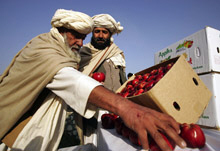
Typical street scene in Santa Ana, El Salvador. (Photo: iStock)
IMF Survey: Fragile States Need Better Local Financial Management
January 24, 2011
- Conference held in London with countries and donors to discuss fragile states
- More transparent, accountable government budgets needed to improve economic conditions
- Countries’ ownership of effective reforms key to absorption of donor funds
Better financial management of public resources, including those provided by donors, as well as local leadership and ownership of reforms are vital to help countries from Afghanistan to Zimbabwe better rebuild their economies.

Vendors in Kabul, Afghanistan: fragile states need better management of public finances to rebuild their economies (photo: Newscom)
PUBLIC FINANCES
The role of development finance and public financial management reform to help fragile states to achieve stability and sustainable growth was the focus of the 6th annual Centre for Aid and Public Expenditure (CAPE) conference in London in November, co-hosted by the IMF’s Fiscal Affairs Department and the Overseas Development Institute (ODI) of the United Kingdom.
Buy-in for reforms from a wide range of stakeholders in the country is key, as are less complex procurement procedures that still provide transparency and accountability to donors, the participants said. As many of these countries strengthen their democracies, the role of parliaments in the budget process is increasingly important.
Individual country needs and circumstances also should be understood to get finance flowing, according to participants.
While a country’s status as a fragile state remains open for debate, as a group they share some basic characteristics, such as very low domestic revenue, few human resources available to help develop the economy, and a lack of physical infrastructure, such as good roads and power grids. Many have also been affected by armed conflict and suffer from poor performance caused by weak institutions.
Ministers of finance from Afghanistan, Liberia, Sierra Leone, and Timor-Leste attended the conference along with representatives from the Democratic Republic of Congo, Haiti, Kosovo, Solomon Islands, Tajikistan, West Bank & Gaza, Zimbabwe, donor organizations including the African Development Bank and World Bank, academia, and civil society organizations.
Government deficits on decline in low-income countries
In general, low-income countries weathered the global economic crisis thanks to good policies and reforms that were begun before the worst recession in 80 years spread around the world in 2008.
According to the latest issue of the IMF’s Fiscal Monitor, deficits in low-income countries are expected to decline this year and next, after expanding rapidly in 2009 when fiscal policy was loosened in response to the global crisis.
More accountability, less repeating history
With as many views as participants at the conference, a consensus was developed around three key areas of work to help fragile countries strengthen their public financial management.
Do more:
• Share regional experiences of success and failures among countries to deepen their understanding of what works and what does not
• Establish donor public financial management working groups in fragile states to facilitate coordination of donor advice
• Use fragile state public financial management systems with proper accountability to meet donor requirements
• Press for transparency in fragile state budgets and spending.
Do less:
• Minimize donor micromanagement of aid use
• Pass fewer laws that are not relevant or urgent
• Avoid repeating reforms that did not succeed in the past.
Do differently:
• Adopt a new but simple approach to procurement of goods and services financed by donors
• Consider reforming civil service pay to ensure retention of skilled workers provided it is fiscally sustainable
• Sequence public financial management reforms appropriately, for example, placing emphasis on executing the budget can be crucial in certain situations
• Ensure a right mix of short term and long term experts to assist countries implement their reforms.
Sanjeev Gupta, Deputy Director of the IMF’s Fiscal Affairs Department, concluded the conference by stressing that public financial management reforms are important in fragile states.
“We can start making a push for change,” he said. “With greater discussion among key players we can expect some change down the line.”
Marcus Manuel, the head of Program for the Center for Aid and Public Expenditures at the Overseas Development Institute said that “the conference demonstrated that collectively we need to learn more from the range of fragile state experiences.”
Work is already under way in Liberia and Southern Sudan to support budget processes and systems in countries considered fragile. A full report of the conference is available on the ODI website.


